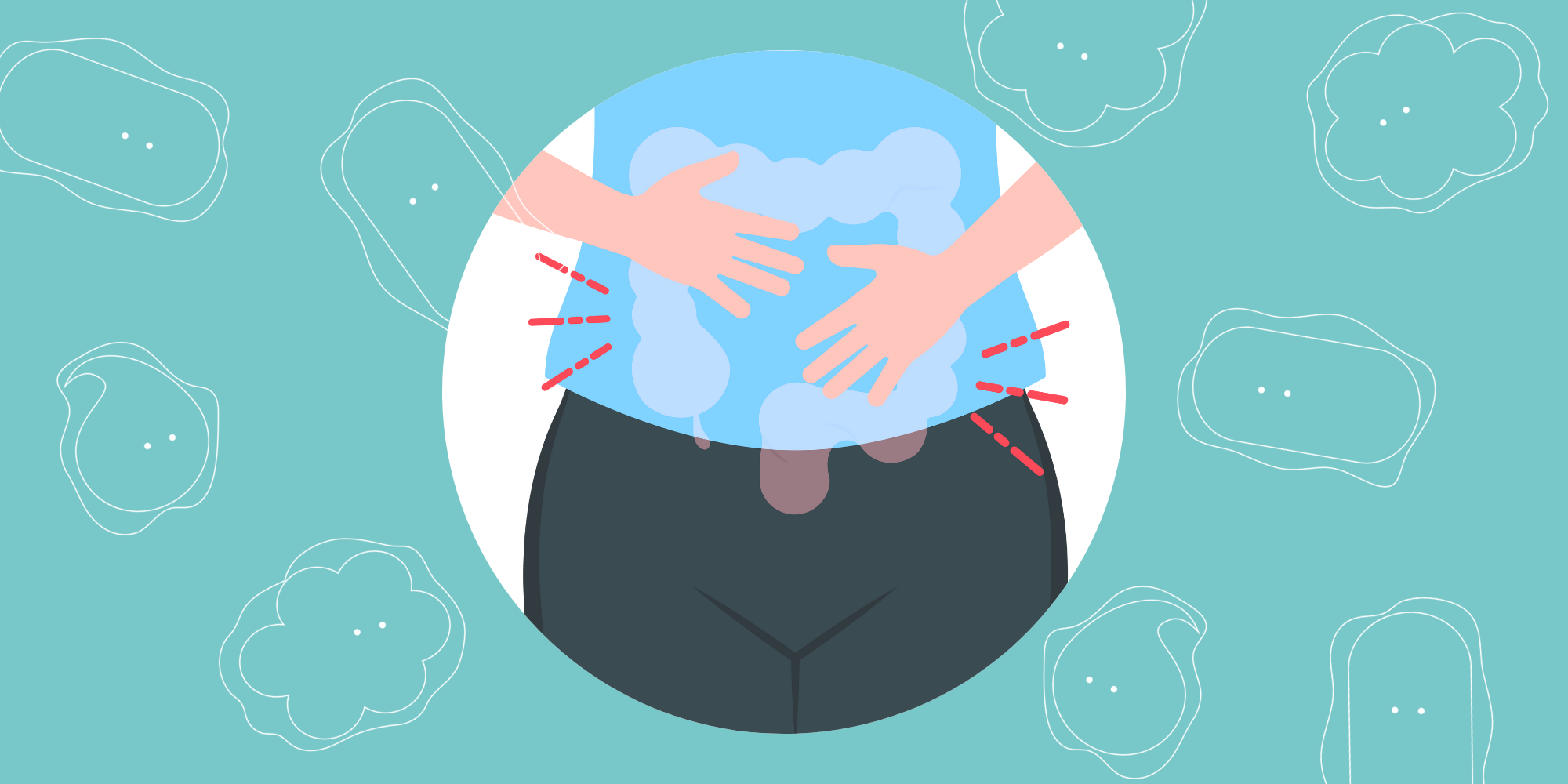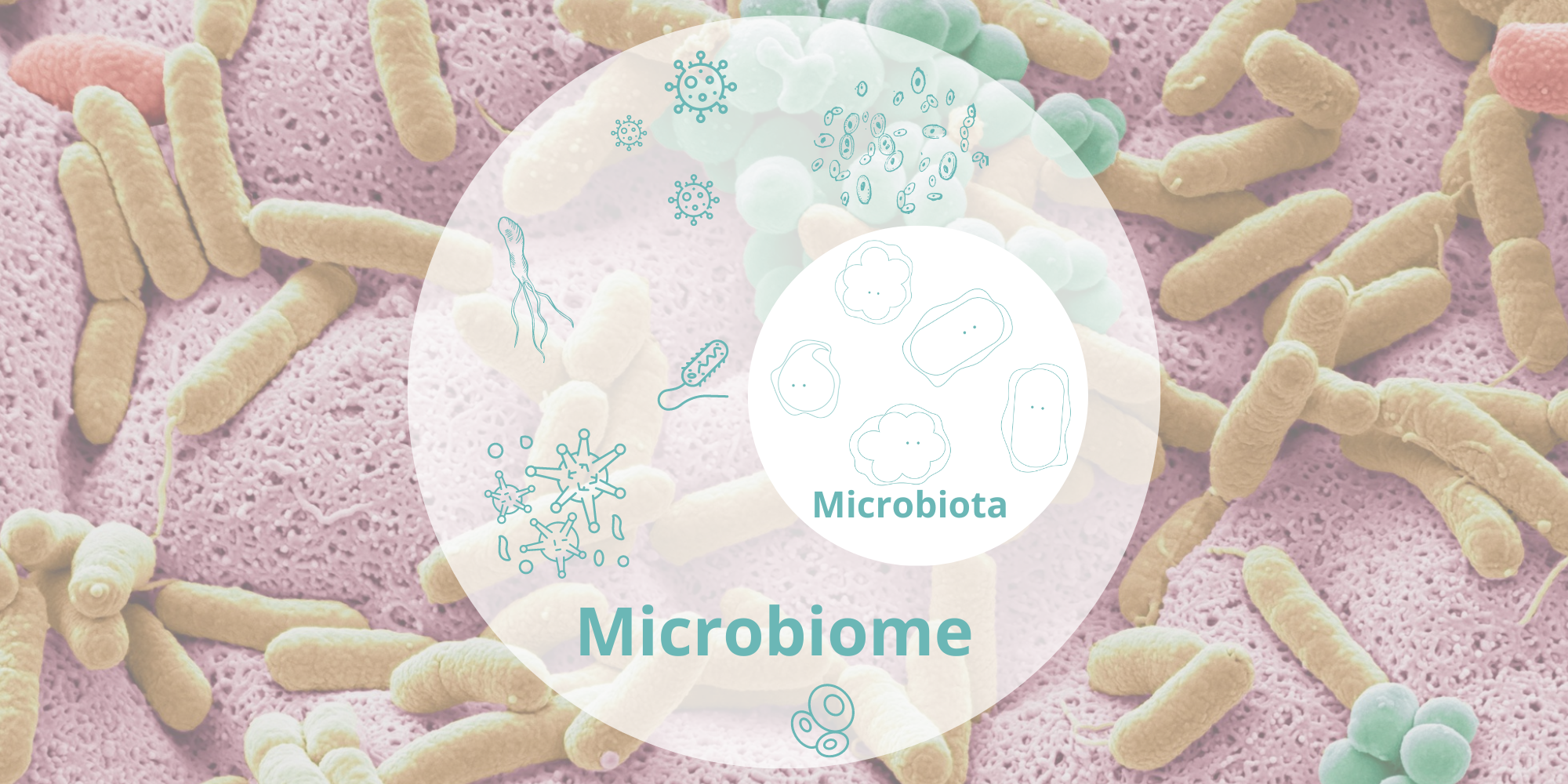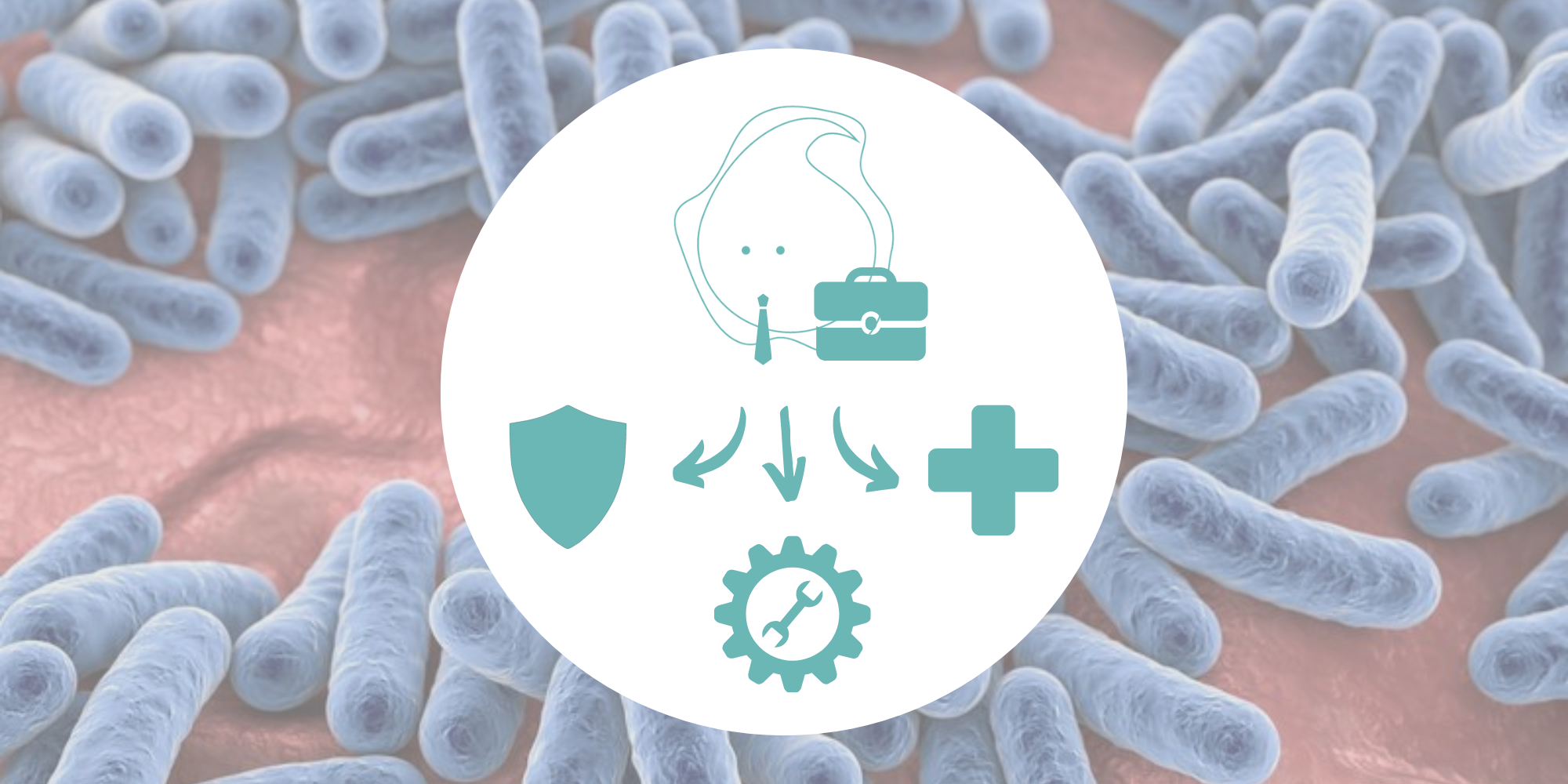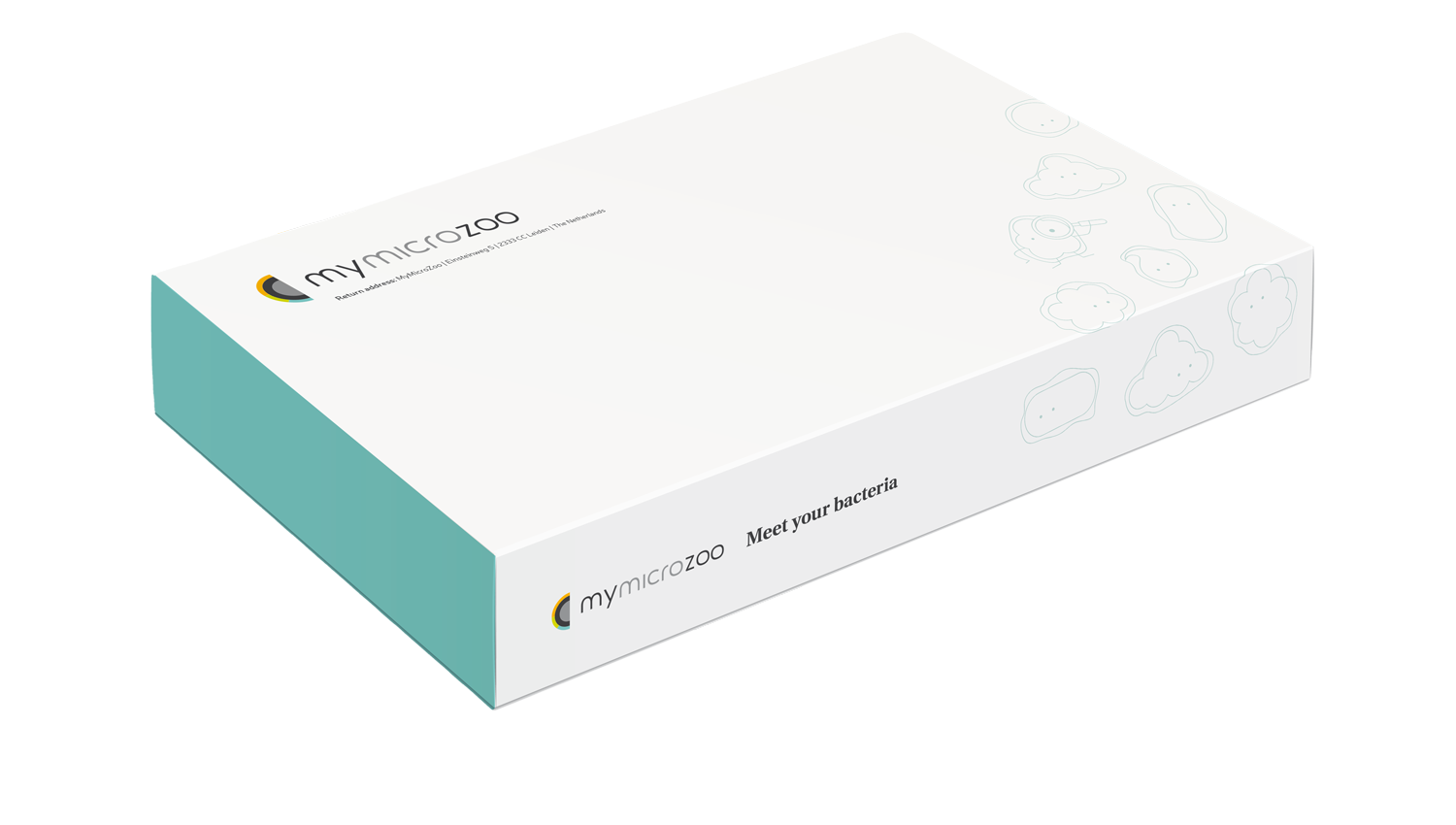Last updated: 08/30/2025
Stomach pain after a healthy salad, bloating without a clear reason, or bowel movements that are never the same from one day to the next. If you have Irritable Bowel Syndrome (IBS), this probably sounds all too familiar. Chances are you have already tried various diets and supplements, but the advice is often contradictory.
More and more scientific research points to a key player in this field: your microbiome. In this blog, you will read about the role your microbiome plays in IBS and how that insight may help reduce your symptoms.
On this page you’ll read:
- In short: what is IBS?
- The microbiome of someone with IBS
- What does science say right now?
- Testing with IBS: does it help?
- Summary
In short: what is IBS?
IBS is a common chronic condition: about five to ten percent of the Dutch population deals with it. In IBS, the gut is hypersensitive and reacts to the smallest trigger. The result: abdominal pain, bloating, gas, bowel movements that vary wildly, and so on. These symptoms not only differ from person to person, but can also be completely different from day to day in the same person.
The exact cause is still not fully known. Scientists are actively searching for answers: what causes IBS, and how can symptoms be reduced or even completely resolved? Their focus is mainly on four major factors: stress, exercise, diet, and the microbiome.
The microbiome of someone with IBS
And that microbiome is a world of its own. It consists of billions of bacteria, yeasts, and other microbes that live in your gut. Increasingly, research shows that the composition of the microbiome in people with IBS differs from that of people without daily digestive complaints. And that difference can tell us a lot about why your bowels sometimes react so strongly.
Think of your microbiome as an ecosystem: a rainforest full of different species, each with its own role. Some bacteria help break down food, others produce vitamins, and some protect you from intruders. In people with IBS, this rainforest is often less diverse: certain beneficial species are in the minority, while other bacteria dominate. This may lead to increased gas production, a sensitive gut lining, and sometimes even mild inflammatory reactions.
The tricky part is that which bacteria are out of balance differs from person to person. That’s why there is no one-size-fits-all solution. What works for one individual may do nothing – or even worsen symptoms – for another. This is exactly why personal microbiome analyses are increasingly seen as the path to more targeted advice.
What does science say now?
Researchers are learning more and more about the link between IBS and the microbiome. These are the key findings so far:
- Lower diversity: studies show that people with IBS often have a less diverse microbiome. A narrow microbiome is less able to buffer changes in diet or stress.
- Different balance of helpful vs. unwanted bacteria: some helpful bacteria, such as Bifidobacterium and Faecalibacterium, are often less abundant in IBS, while species that produce more gas are more common.
- More sensitive gut lining: an altered microbiome can produce substances that make the gut lining more sensitive, so signals reach the brain faster—and you feel pain or discomfort sooner.
- Gas production and fermentation: certain bacteria break down carbohydrates into gases. When the balance is off, this can lead to extra gas, bloating, and cramps.
- Big individual differences: no two microbiome profiles are the same. What causes symptoms in one person may be neutral for another. That’s why scientists focus more on individual analyses instead of averages.
Testing with IBS: is it useful?
Because IBS and the microbiome differ in every person, it’s difficult to get symptoms under control with general advice alone. You can endlessly experiment with diet, supplements, and lifestyle, but without knowing what exactly is happening in your gut, it’s like shooting in the dark.
A microbiome analysis gives you a personal picture: which bacteria are abundant in you, which are lacking, and how that may relate to your symptoms.
The test results show clearly who ‘lives’ in your gut and help you make more targeted changes in diet or lifestyle. You don’t receive a generic tips list, but advice tailored to your unique microbiome—so you can answer which nutrition and lifestyle choices are right for you.
Summary
IBS is a complex puzzle in which diet, stress, movement, and your microbiome are all pieces. Science increasingly shows that the bacterial community in your gut is hugely important. And because no two people—or microbiomes—are the same, there’s no one-size-fits-all solution. Taking a microbiome test can help by giving you insight into which specific changes might reduce your symptoms.
Find out here how our test works in detail, or watch this webinar where we compare our test with other microbiome methods.
With IBS, read your microbiome report in a different order
After taking a microbiome test you’ll receive a report that explains your gut health step by step in four chapters. The order is optimized for what’s usually most important. Do you have IBS? Then it’s better to follow an adjusted order, because other bacterial groups often have more impact on your symptoms. Download the guide here to read your microbiome report if you have IBS.
In your report, you receive a score for each of these four aspects, shown with a green, pink, or orange colour.
Unwanted bacteria
Many gut bacteria can disrupt body processes and cause pain or other symptoms. This happens especially when these unwanted bacteria live in high numbers in the gut (pink or orange). In the results report, we discuss three groups of unwanted bacteria: sulphate-reducing bacteria, proteobacteria, and several specific ‘notorious’ species.
When one or more of these groups are strongly present in your microbiome, this may actually be the cause of your digestive complaints – rather than IBS. In that case, it is important to reduce these bacteria scores. If symptoms continue afterwards, then IBS is more likely the underlying cause.
Energy production: butyrate-producing bacteria
Some gut bacteria produce beneficial energy compounds when breaking down dietary fibres. There are three types of these: butyrate, propionate, and acetate. Sufficient butyrate is crucial (green) for healthy bowel function. For example, it protects the mucus layer covering the gut cells. A strong gut wall reduces the risk of inflammation. If this layer is weak (for example due to a shortage of butyrate – pink or orange), inflammation can develop, and pathogens can more easily reach gut cells, causing irritation, pain, or disrupted bowel movements – symptoms familiar in IBS.
Beneficial bacteria
There are many helpful gut bacteria, each with important functions. In the report, we discuss 14 of these bacteria/groups. Low levels of these in your microbiome (pink or orange) aren’t immediately bad or unhealthy. But it’s important to have enough helpful bacteria (green) because they contribute to a diverse, balanced microbiome—among other things by limiting the growth and activity of unwanted bacteria.
One example: bacteria that produce lactic acid (lactate). Lactate makes the gut slightly more acidic, which stimulates many other helpful bacteria and inhibits unwanted ones.
Diversity
A diverse microbiome (green) means many different bacterial species are present. This ensures enough bacteria can work together to perform beneficial functions, making you more resilient to pathogens and less likely to experience digestive complaints. With a less diverse microbiome (pink or orange) – more often seen in IBS – imbalances can develop: beneficial bacteria struggle to grow, while pathogens can thrive, disrupting digestion and bowel movements and triggering symptoms.
Sources:
Carroll, I. M., Ringel-Kulka, T., Siddle, J. P., & Ringel, Y. (2012). Alterations in composition and diversity of the intestinal microbiota in patients with diarrhea-predominant irritable bowel syndrome. Neurogastroenterology and Motility, 24(6), 521–e248. https://doi.org/10.1111/j.1365-2982.2012.01891.x
Chassard, C., Dapoigny, M., Scott, K. P., Crouzet, L., Del'homme, C., Marquet, P., Martin, J. C., Pickering, G., Ardid, D., Eschalier, A., Dubray, C., Flint, H. J., & Bernalier-Donadille, A. (2012). Functional dysbiosis within the gut microbiota of patients with constipated-irritable bowel syndrome. Alimentary Pharmacology & Therapeutics, 35(7), 828–838. https://doi.org/10.1111/j.1365-2036.2012.05007.x
Jeffery, I. B., O'Toole, P. W., Öhman, L., Claesson, M. J., Deane, J., Quigley, E. M., & Simrén, M. (2012). An irritable bowel syndrome subtype defined by species-specific alterations in faecal microbiota. Gut, 61(7), 997–1006. https://doi.org/10.1136/gutjnl-2011-301501
Kushkevych, I., LešÄÂÂÂÂÂÂÂÂÂanová, O., Dordević, D., JanÄÂÂÂÂÂÂÂÂÂíková, S., Hošek, J., Vítázová, M., BuÄÂÂÂÂÂÂÂÂÂková, L., & Drago, L. (2019). The Sulfate-Reducing Microbial Communities and Meta-Analysis of Their Occurrence during Diseases of Small–Large Intestine Axis. Journal of Clinical Medicine, 8(10), 1656. https://doi.org/10.3390/jcm8101656
Labus, J. S., Hollister, E. B., Jacobs, J., Kirbach, K., Oezguen, N., Gupta, A., Acosta, J., Luna, R. A., Aagaard, K., Versalovic, J., Savidge, T., Hsiao, E., Tillisch, K., & Mayer, E. A. (2017). Differences in gut microbial composition correlate with regional brain volumes in irritable bowel syndrome. Microbiome, 5(1), 49. https://doi.org/10.1186/s40168-017-0260-z
Liu, H. N., Wu, H., Chen, Y. Z., Chen, Y. J., Shen, X. Z., & Liu, T. T. (2017). Altered molecular signature of intestinal microbiota in irritable bowel syndrome patients compared with healthy controls: A systematic review and meta-analysis. Digestive and Liver Disease, 49(4), 331–337. https://doi.org/10.1016/j.dld.2017.01.142
Liu, Y., Li, W., Yang, H., Zhang, X., Wang, W., Jia, S., Xiang, B., Wang, Y., Miao, L., Zhang, H., Wang, L., Wang, Y., Song, J., Sun, Y., Chai, L., & Tian, X. (2021). Leveraging 16S rRNA Microbiome Sequencing Data to Identify Bacterial Signatures for Irritable Bowel Syndrome.
Malinen, E., Rinttilä, T., Kajander, K., Mättö, J., Kassinen, A., Krogius, L., Saarela, M., Korpela, R., & Palva, A. (2005). Analysis of the fecal microbiota of irritable bowel syndrome patients and healthy controls with real-time PCR. The American Journal of Gastroenterology, 100(2), 373–382. https://doi.org/10.1111/j.1572-0241.2005.40312.x
Nagel, R., Traub, R. J., Allcock, R. J., Kwan, M. M., & Bielefeldt-Ohmann, H. (2016). Comparison of faecal microbiota in Blastocystis-positive and Blastocystis-negative irritable bowel syndrome patients. Microbiome, 4(1), 47. https://doi.org/10.1186/s40168-016-0191-0
Pittayanon, R., Lau, J. T., Yuan, Y., Leontiadis, G. I., Tse, F., Surette, M., & Moayyedi, P. (2019). Gut Microbiota in Patients With Irritable Bowel Syndrome—A Systematic Review. Gastroenterology, 157(1), 97–108. https://doi.org/10.1053/j.gastro.2019.03.049
Prikkelbare Darm Syndroom Belangenorganisatie. (2022, November 29). Diagnose – prikkelbare darm syndroom Belangenorganisatie. https://www.pdsb.nl/diagnose/
Rajilić-Stojanović, M., Biagi, E., Heilig, H. G., Kajander, K., Kekkonen, R. A., Tims, S., & de Vos, W. M. (2011). Global and deep molecular analysis of microbiota signatures in fecal samples from patients with irritable bowel syndrome. Gastroenterology, 141(5), 1792–1801. https://doi.org/10.1053/j.gastro.2011.07.043
Rangel, I., Sundin, J., Fuentes, S., Repsilber, D., de Vos, W. M., & Brummer, R. J. (2015). The relationship between faecal-associated and mucosal-associated microbiota in irritable bowel syndrome patients and healthy subjects. Alimentary Pharmacology & Therapeutics, 42(10), 1211–1221. https://doi.org/10.1111/apt.13399
Salminen, S., von Wright, A., Morelli, L., Marteau, P., Brassart, D., de Vos, W. M., Fondén, R., Saxelin, M., Collins, K., Mogensen, G., Birkeland, S. E., & Mattila-Sandholm, T. (1998). Demonstration of safety of probiotics — a review. International Journal of Food Microbiology, 44(1–2), 93–106. https://doi.org/10.1016/S0168-1605(98)00128-7
Sheikh Sajjadieh, M. R., Kuznetsova, L. V., & Bojenko, V. B. (2012). Dysbiosis in Ukrainian children with irritable bowel syndrome affected by natural radiation. Iranian Journal of Pediatrics, 22(3), 364–368.
Su, Q., Tun, H. M., Liu, Q., Yeoh, Y. K., Mak, J. W. Y., Chan, F. K., & Ng, S. C. (2023). Gut microbiome signatures reflect different subtypes of irritable bowel syndrome. Gut Microbes, 15(1), 2157697. doi: https://doi.org/10.1080/19490976.2022.2157697
Vich Vila, A., Imhann, F., Collij, V., Jankipersadsing, S. A., Gurry, T., Mujagic, Z., Kurilshikov, A., Bonder, M. J., Jiang, X., Tigchelaar, E. F., Dekens, J., Peters, V., Voskuil, M. D., Visschedijk, M. C., van Dullemen, H. M., Keszthelyi, D., Swertz, M. A., Franke, L., Alberts, R., Festen, E. A. M., … Weersma, R. K. (2018). Gut microbiota composition and functional changes in inflammatory bowel disease and irritable bowel syndrome. Science Translational Medicine, 10(472), eaap8914. https://doi.org/10.1126/scitranslmed.aap8914
Wang, L., Alammar, N., Singh, R., Nanavati, J., Song, Y., Chaudhary, R., & Mullin, G. E. (2020). Gut Microbial Dysbiosis in the Irritable Bowel Syndrome: A Systematic Review and Meta-Analysis of Case-Control Studies. Journal of the Academy of Nutrition and Dietetics, 120(4), 565–586. https://doi.org/10.1016/j.jand.2019.05.015
Zeber-Lubecka, N., Kulecka, M., Ambrozkiewicz, F., Paziewska, A., Goryca, K., Karczmarski, J., Rubel, T., Wojtowicz, W., Mlynarz, P., Marczak, L., Tomecki, R., Mikula, M., & Ostrowski, J. (2016). Limited prolonged effects of rifaximin treatment on irritable bowel syndrome-related differences in the fecal microbiome and metabolome. Gut Microbes, 7(5), 397–413. https://doi.org/10.1080/19490976.2016.1215805
Zhong, W., Lu, X., Shi, H., Zhao, G., Song, Y., Wang, Y., Zhang, J., Jin, Y., & Wang, S. (2019). Distinct Microbial Populations Exist in the Mucosa-associated Microbiota of Diarrhea Predominant Irritable Bowel Syndrome and Ulcerative Colitis. Journal of Clinical Gastroenterology, 53(9), 660–672. https://doi.org/10.1097/MCG.0000000000000961





